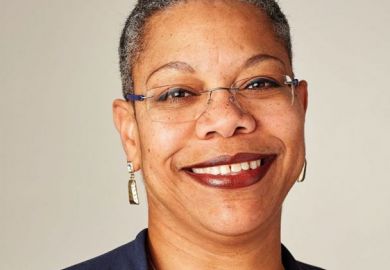Bradley Hughes is transnational English executive at UTS Insearch, the pathway provider for the University of Technology Sydney, where he was previously curriculum manager for English language programmes. He served four years as associate dean of English programmes at the Sydney Institute of Language and Commerce at Shanghai University. He has spent almost two decades as an assessor and trainer for the Cambridge Certificate in English Language Teaching to Adults and has taught English in Tokyo, Kathmandu, Bangalore and Sydney.
Where and when were you born, and how has it shaped you?
The Northern Beaches of Sydney in 1958. I grew up surfing. It was very Anglo-Celtic, as all the area was, with few ethnic minorities – Yugoslav, Italian, maybe some Greek, but that was about it.
What drew you to language study, in a place with so little exposure to languages?
I got interested in Asian studies. I always liked history. The antiquity of Asia – the continuity and depth of its culture and history – seemed to trump European history. My undergraduate degree was in two areas: Asian studies, with Japanese; and pure linguistics.
From a monolingual background, you studied not only a foreign language but also the theory of language. What was the appeal?
I did first-year linguistics and just fell into it. I loved the analysis of syntax. I loved looking at the notions of semantic domains and meanings, of words and phrases – different ways of looking at meaning through language and culture, because language is an expression of a culture. Language is like shared cultural habits; shared cultural ideas. If you look at linguistic pragmatics, it’s not just grammar and vocabulary. It’s social interaction.
How does English language teaching differ from regular university teaching?
Language teaching methodology is completely different from teaching non-language subjects – English literature, for example, or mathematics or science. The theory behind modern language teaching is the idea of using the target language to teach the target language. Which means you’re putting students into an immersion environment. The teachers need to grade their language to the level of the students’ comprehension. And they need to limit their teacher talk so they don’t overload students with the language they’re teaching. There’s a lot of emphasis on not saying anything you don’t need to say.
Could regular university teachers learn a trick or two from English teachers?
Absolutely. Lecturers whose classes include international students – non-native English speakers – can take a lot from language teaching methodology, where teachers are made to be very conscious of the language they use in the classroom. What’s the point of giving a complex anecdote that relates to your cultural background as a teacher when the students don’t come from your culture and are not privy to the cultural anecdote you’re providing? It’s meaningless to them. I’m not talking about speaking pidgin; I’m talking about grading your language output according to the students’ English level. I’m also talking about not using 30 words to give students simple instructions, like “turn to page 3”. If you’ve got non-native speaking students, you’ve just bombarded them with a whole stream of language because you’re thinking aloud. The students may not know that you’re thinking aloud. They’re trying to listen, within that stream of consciousness, for the key things. That kind of awareness – that’s what language teachers learn.
Can that awareness also help when you’re teaching domestic students?
Yes. It’s up to teachers to take charge of their objectives. Who’s your audience? What do you want to achieve? Be clear what your goals are. As a lecturer, it’s up to you to manage that, and some people are better at it than others.
You talked about bombarding people with language. What about bombarding people with information?
It’s much easier to provide more information than less information. But, as teachers, when we have a specific objective in our topic or theory areas, we need to stay focused on it and lead the audience towards it. Take responsibility for editing your work down; for not inundating and overloading your audience so that your objective probably won’t be achieved. Reflect on yourself. Reflect on your lesson.
You’re saying less is more?
It’s about dropping the ego and focusing on the purpose. And that is to impart knowledge; to achieve learning outcomes. Take charge of the material. Edit it, focus it and keep it on track. In English for academic purposes, students will be given a range of texts to work from. The task is for them to find what’s relevant for them in those texts, and what’s not relevant. It’s so much easier for them just to put in everything and not think about the relevance to the task. The challenge – in teaching, in presenting, in writing an essay – is focusing on relevance and deciding what not to put in; cutting it right back so that it’s very clear where you’re going. It’s a discipline. The alternative is egotistical laziness.
What would you like to see more of in Australian higher education?
There needs to be much more supportive research partnerships between Australian universities and universities in Asia, particularly South-east Asia.
If you were universities minister for a day, what would you do?
I must emphasise the importance of the Australian government listening to the higher education providers that are out there working and engaging with the region. There’s not enough support; not enough listening. Talk to us. Listen to our experience of engaging with academic administrators in the region. Ask for our advice on where funding, where support, needs to go.
john.ross@timeshighereducation.com
Appointments
Janet Nelson has been appointed deputy vice-chancellor (research and innovation) at the University of Newcastle. Professor Nelson, who will move to Australia in February, is currently vice-president for research and economic development at the University of Idaho. She has previously held roles as associate vice-chancellor of research development at the University of Tennessee and as a director at the Biotechnology Industry Organisation in Washington DC. Newcastle vice-chancellor Alex Zelinsky said he was thrilled that “a demonstrated leader with experience across academia, government, not-for-profit organisations and industry is joining our senior executive team”.
Osama Khan has been promoted to the role of vice-provost (education) at the University of Surrey, where he is currently associate dean (education) in the Faculty of Arts and Social Sciences. Previously, he has held roles at Solent University, including director of learning and teaching at the Solent Learning and Teaching Institute and pro vice-chancellor (students and teaching). Professor Khan said he would “advocate for a student-centred, industry- and community-focused, research-informed and technology-enhanced curriculum”.
Queensland University of Technology has promoted Christopher Barner-Kowollik to the post of deputy vice-chancellor and vice-president (research and innovation). He is currently professor of materials science at the institution. QUT also announced that Robina Xavier, currently executive dean of its business school, will take on the new role of deputy vice-chancellor and vice-president (education).
Ian Cumming, chief executive of Health Education England, has been appointed to a new role as professor of global healthcare workforce and strategy at Keele University. He will take up the role in April 2020.
Marty Reid has been appointed head of Engine Shed, an innovation hub that is a collaboration between the University of Bristol, Bristol City Council and the West of England Local Enterprise Partnership.
Register to continue
Why register?
- Registration is free and only takes a moment
- Once registered, you can read 3 articles a month
- Sign up for our newsletter
Subscribe
Or subscribe for unlimited access to:
- Unlimited access to news, views, insights & reviews
- Digital editions
- Digital access to THE’s university and college rankings analysis
Already registered or a current subscriber?








